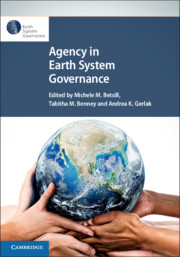Book contents
- Agency in Earth System Governance
- Series page
- Agency in Earth System Governance
- Copyright page
- Contents
- Contributors
- Acknowledgments
- Part One Introduction and Overview
- Part Two Agency and the Dynamics of Earth System Governance
- Part Three Policy Implications and the Future of Agency in Earth System Governance Research
- 15 Conclusion: Policy Implications of ESG–Agency Research and Reflections on the Road Ahead
- Appendix ESG–Agency Harvesting Database
- References
- Index
15 - Conclusion: Policy Implications of ESG–Agency Research and Reflections on the Road Ahead
from Part Three - Policy Implications and the Future of Agency in Earth System Governance Research
Published online by Cambridge University Press: 04 January 2020
- Agency in Earth System Governance
- Series page
- Agency in Earth System Governance
- Copyright page
- Contents
- Contributors
- Acknowledgments
- Part One Introduction and Overview
- Part Two Agency and the Dynamics of Earth System Governance
- Part Three Policy Implications and the Future of Agency in Earth System Governance Research
- 15 Conclusion: Policy Implications of ESG–Agency Research and Reflections on the Road Ahead
- Appendix ESG–Agency Harvesting Database
- References
- Index
Summary
− The role of the state as an agent of earth system governance has become more complex, contingent, and interdependent. − Although participatory and collaborative processes have contributed to more effective, equitable, and legitimate environmental governance outcomes in some instances, analyses of these processes should be situated within a broader governance perspective, which recasts questions of policy change around questions of power and justice. −The complexity and normative aspects of agency in earth system governance requires new forms of policy evaluation that account for social impacts and the ability of governance systems to adapt. − Many of the core analytical concepts in ESG–Agency scholarship, such as agency, power, authority, and accountability, remain under-theorized. In addition, some types of actors, including women, labor, non-human agents, those who work against earth system governance, and many voices from the Global South, remain largely hidden. − ESG–Agency scholars need to develop research projects and collaborations in understudied regions while also recruiting and supporting scholars in those regions to engage with this research agenda.
- Type
- Chapter
- Information
- Agency in Earth System Governance , pp. 183 - 197Publisher: Cambridge University PressPrint publication year: 2020
- 1
- Cited by



